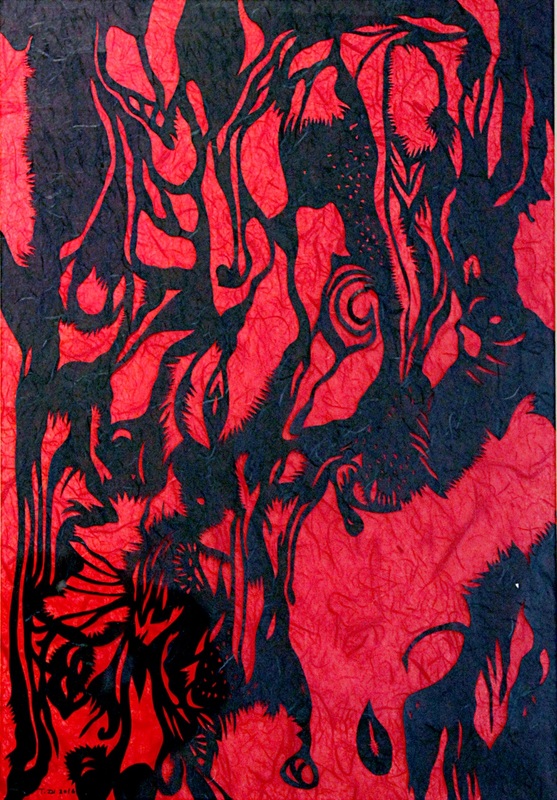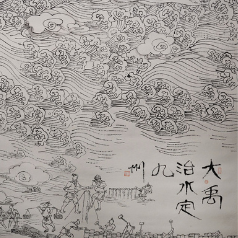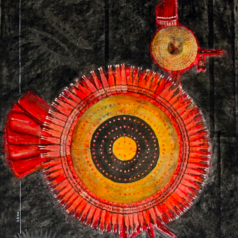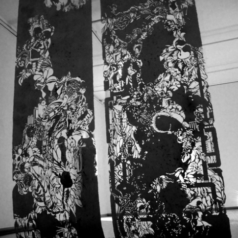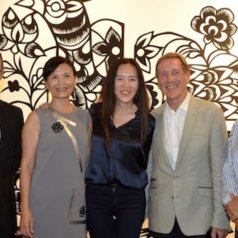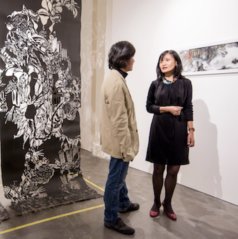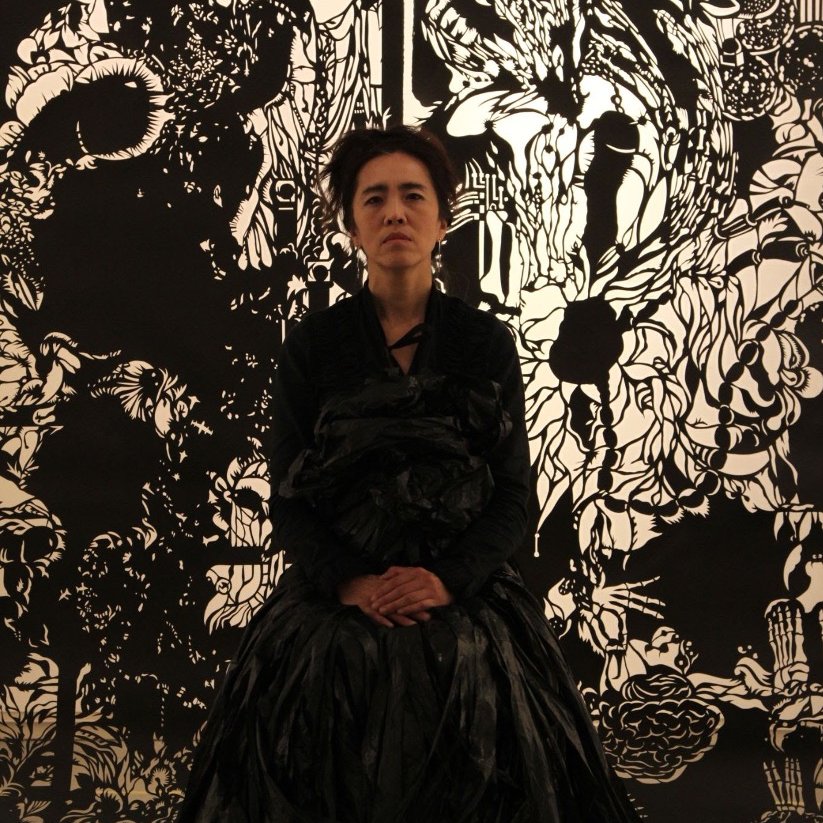
Tianli Zu (b.1963, Beijing, China) currently lives and works in Sydney. She graduated from the China Central Academy of Fine Arts, and she gained an MFA from the Sydney College of the Arts, University of Sydney. In 2014, Zu received a Doctoral degree from the University of Sydney. Zu creates large-scale papercuts by hand and cinematic animation projections that weave through history and the present, using shadow and light in powerful dynamic installations. Her work captures experiences of places and cultures through intuitive and metaphysical means. She employs art to engage and comment on complex social phenomena, culturally, philosophically and psychologically.
Zu was a Finalist in the Archibald Prize and the North Sydney Art Prize, and the Hazelhurst Art on Paper Award. Her work was exhibited in the Salon Des Refuses and featured several times at Martin Place and the heart of Chinatown for the Chinese New Year Festival in Sydney.
CV
| 1963 | Born in Beijing |
| 1987 | Bachelor of Fine Arts, China Central Academy of Fine Arts (CAFA) |
| 2010 | Master of Fine Arts, Sydney College of the Arts, The University of Sydney |
| 2014 | Doctor of Philosophy, Sydney College of the Arts, The University of Sydney |
| Present | Lives and works in Sydney |
| 2015 | “Elemental”, China Cultural Centre in Sydney |
| “Shadow Maze”, Hazelhurst Regional Gallery, Gymea | |
| 2013 | “Shadow Makes This World”, PhD Degree Show, Sydney College of the Arts (SCA), The University of Sydney |
| “White Shadows-In Possible Worlds”, 4A Centre for contemporary Asian Art, Sydney | |
| “Shadows of Strange Things”, | |
| Art Month Sydney, Rozelle Contemporary Art Precinct (RCAP), Sydney College of the Arts, The University of Sydney | |
| 2012 | “Identical Differences”, Sydney College of the Arts, The University of Sydney |
| 2011 | “Un-named”, Art Atrium, Sydney |
| 2010 | “Infinite Universe”, Chinese Cultural Centre, Sydney |
| 1988 | “Dragon Stamp (Year of the Dragon)”, Ministry of Posts and Telecommunications of China |
| 2016 | “The Senator and Ma”, S.H. Ervin Gallery, Sydney |
| 2015 | “In Her Shadow Of, ‘Memory Fragments’”, Art Space on The Concourse, Willoughby City Council |
| 2014 | “Masks II, ‘Chinese Whispers’”, Goulburn Art Regional Gallery, Sydney |
| “Openness”, Spot 81, Chippendale | |
| “Mask, ‘I Want to Change the World’”, Art Museum of GAFA, Guangzhou, China | |
| “Nuwa created horses on the sixth day, ‘Crossing Boundaries – A Celebration of Contemporary Asian Australian Art’”, Sydney Town Hall, City of Sydney | |
| 2013 | “Nuwa is Pregnant II, ‘Snake, Snake, Snake’”, Sydney Chinese New Year Festival, Sydney Town Hall, City of Sydney |
| 2012-13 | “A Wonderful World, ‘Carrying Tigers Over Mountains’”, Permanence Gallery, 798 Art District, Beijing, China |
| 2012 | “Nuwa is Pregnant II, ‘Critical Thinking: Research + Art + Culture’”, SCA Graduate School Exhibition, The University of Sydney |
| 2012-15 | “Nuwa is Pregnant, ‘Made in China, Australia’”, touring exhibition, Salamanca Arts Centre, Hobart |
| 2012 | “A Wonderful World, ‘The Price of War’”, Chinalink Gallery and the University of Sydney Confucius Institute, Sydney |
| “A Wonderful World, ‘I Am What I Play’”, in association with AAANZ conference and AIAS conference, National Art School, Sydney | |
| “A Wonderful World, ‘Cinema Alley 2012’”, 4A Animation Project, 4A Centre for Contemporary Asian Art, Sydney | |
| “‘Breathe’, Sydney Chinese New Year Festival exhibition”, Art Atrium, Sydney | |
| “Nuwa is Pregnant, ‘Paper Now’”, The Incinerator Art Space, Willoughby City Council | |
| 2011 | “Everything can be seen as a this, ‘Open Call’”, Verge Gallery, The University of Sydney |
| “Tale, ‘Cinema Alley 2011’”, Selections from the 4A Animation Project, 4A Centre for Contemporary Asian Art, Sydney | |
| 2010 | “An In-between-er Binds in Shadow”, MFA Degree Show, SCA, The University of Sydney |
| “Tale, ‘Comings and Goings: Lai-lai Wang-wang’”, The Inaugural Documentary Exhibition of Chinese-Australian Contemporary Art, Chinalink Gallery, Sydney |
| 2015 | Edmund, your Twomblys are behind you. Archibald prize 2015 – Finalist |
| Shelter of Shadows, North Sydney Art Prize – Finalist and Encouragement Award | |
| 2013 | Nuwa is Pregnant II, North Sydney Art Prize – Finalist |
| Nuwa is Pregnant II, Hazelhurst Art on Paper Award, Hazelhurst Regional Gallery & Arts Centre – Finalist | |
| 2012 | Nuwa is Pregnant, ‘Works on Paper Prize and Exhibition’, Brunswick Street Gallery, Melbourne – Merit Award |
| 2011 | Up is down, down is up, 4A Centre for Contemporary Asian Art – Emerging Artist Initiative Award |
| Everything can be seen as a this, Willoughby Sculpture Prize – Finalist |
| 2015 | 2015: Collection of Recent Works |
| 2014 | Shadow Makes This World (foreword by Colin Rhodes) |
| 2013 | White Shadows (with an interview by Luise Guest) |
| 2012 | Shadows of Strange Things (with an essay by Nicholas Tsoutas) |
| 2011 | Identical Differences |
| 2010 | Un-named |
| 2016 | The Ox Lantern – Chinese Zodiac Lantern Exhibition Martin Place, Sydney, Commissioned by: City of Sydney |
| Light projection on the National Library of Australia Enlighten Canberra, Commissioned by: The National Library of Australia and Enlighten Canberra |
